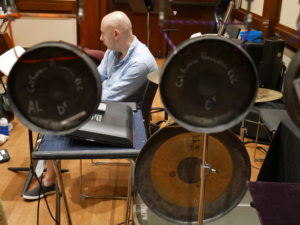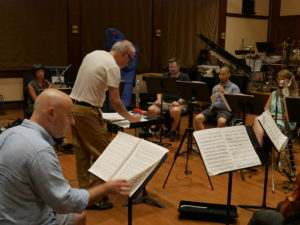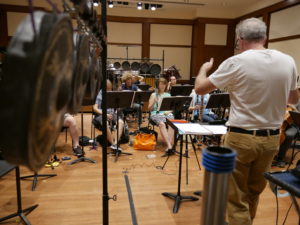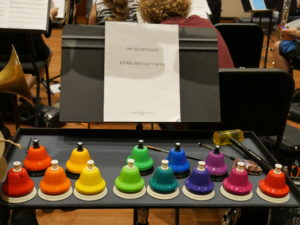
Oscar Bettison, Composer
Talea kicks off the 2018-19 season—Our 10th anniversary year—with its opening night as part of TIME:SPANS Festival 2018. The program is a split bill of large ensemble works by Oscar Bettison and Felipe Lara, colleagues at the Peabody Institute of Music. I sat down with Oscar during a break from rehearsal to chat about his life, work, and tonight’s feature: Livre des Sauvages
ZS: To start, I’d love for you to tell me a bit more about yourself. You live in Jersey City, NJ and you teach at Peabody, is that right?
OB: Yes, I’ve been at Peabody now for… well, it’ll be 10 years next year. I started in 2009. According to the calendar, anyway!
ZS: But, originally you’re from the UK?
OB: Yes
ZS: And you studied there as well? What’s been your track that brought you to Jersey City and to Peabody?
OB: So, the long story is I’m originally from the Island of Jersey. That’s where I was born.
ZS: The other Jersey?
OB: Yeah [laughs]. My dad’s actually from the North of England and my mum’s from Spain. But, I grew up there. It’s a lovely place, but it’s very small—a tiny little island. And everything that’s really happening in the UK is on the mainland. I went to music school in London, from when I was almost 10. I was a violinist, actually, but during my time there I got more and more interested in composition. There are a few music schools like this in the UK, but the funny thing about Purcell, where I went, is that a lot of composers have come through there. The person who wound up being my undergrad teacher, Simon Bainbridge, had also been a pupil at the school, as well as Oliver Knussen. So, being a composer wasn’t such a weird thing. It was encouraged.
I went on to Royal College of Music for my undergrad, and to the Guildhall for my masters. I was actually teaching composition for a couple years, but I decided I always wanted to leave the UK—just for a little while—to get out and get a different perspective on things. So, I went to the Royal conservatory in the Hague, in the Netherlands, where I studied with Louis Andriessen and Martin Padding.
Originally I meant to go there for a year. But, I left the UK in 2000 and I haven’t lived there since. I really liked it in the Netherlands: it’s like my second home. Even, in a way, my musical home. I go back a lot, and I do a lot of projects there.
I was there for a few years, and I applied to Princeton because I liked the faculty there—and there were some connections with the Hague. I really wanted to teach, in the end, and these days you kind of need a doctorate to do that. I’ve been based in the states ever since. That wasn’t really the plan, but I didn’t ever particularly make plans! [laughs]. After I finished at Princeton I got the job at Peabody, and I love it there. I love our students, I love my colleagues. And one of my colleagues is here…
ZS: A split bill with Felipe Lara on the other half!
OB: Yeah, which is a lovely thing. So, it’s a great place, and we all feel really positive and happy with the department. Our students are out there doing great things. My colleagues are some of the most extraordinary, talented composers I know.

ZS: I’m wondering what it’s been like to step between these different musical homes. Music in the UK has this incredibly long history that’s still present today—you mentioned attending “Purcell” music school, for example. There’s an orthodoxy surrounding classical music, but it’s very valued and very treasured, and people like Olly [Knussen] or Simon Bainbridge are these titans who support young composers. Somewhere like the Netherlands, though, you have a lot more continental influence, and a history of noise music too, for instance. Then, at Princeton there’s a rock or jazz influence that isn’t so present in the UK. What has it been like filtering through these different musical climates?
OB: That’s a good question. It’s interesting. Now, as I’m older and I’ve sort-of gotten to know places, it’s different being a student and being a professional (or, whatever the other thing is that’s not being a student). It was really incredibly jarring when I went to the Netherlands—and I mean that in the most positive way. It was a massive culture shock. My first lesson with Martin Padding we were going through my music, and he told me I had great technique. I said “thank you”, and he said, “oh, I’m sorry, I don’t mean that as a compliment.” But, in the UK, at least my feeling of it—I’m not saying this is the truth, I’m saying this is my feeling of it—technique was really the thing you were really taught to know from an early age. You listen to any English composer, even kids that are in school, and the technique is there, the orchestration is there.
ZS: It sounds like a million bucks.
OB: Like a million bucks, absolutely. And, that is very important. But, there are other things. And, when I went to the Hague, they said, yeah, fine, but why don’t you just go for it? Just go nuts! What have you always wanted to do? Write the piece you don’t know how to do. That you’re afraid to do. And it’s incredibly liberating—especially, having a background in technique, and then being told to do that, is amazing. I really try and work at this with my students. They get to a certain stage and their technique is really there, and I say “all right, then, let’s do a 180”. I think you need to try things out that are difficult and hard for you as a composer. You need to push to find out how you know who you are. If you’re always just writing the piece you think you can do, then…

Churning out pieces can be really good at a certain point. In my Master’s that’s really what we had to do, but I think after that point it’s really good to spend a lot of time writing things. To try and push and say, well, I haven’t done this before so I have to do it. I perceive a certain weakness in this piece so the next piece is going to be all about that thing. Why not attack that weakness—the thing you don’t know how to do? That was very different in the Netherlands.
Princeton was different than that, too: much more laid back, and very open, not dogmatic. You could sort of do whatever you want. I really valued that. The other thing was that I valued the time. I had to do academic work of course, but really the idea was that you have time to compose. It’s such a gift. And I was really grateful for that.
 ZS: So, turning to your music, I’m wondering if you can talk about something that I find really vivid about it, which is this combination of very technically engaged virtuosic playing with all these homemade instruments. I think it gives your music this very distinctive and almost “quirky” vocabulary, but everyone walks away from it feeling like everything sounds really good. Everyone feels it draws on all of their skills but also provides a really distinctive musical language for them to play with. How did you refine that and develop it?
ZS: So, turning to your music, I’m wondering if you can talk about something that I find really vivid about it, which is this combination of very technically engaged virtuosic playing with all these homemade instruments. I think it gives your music this very distinctive and almost “quirky” vocabulary, but everyone walks away from it feeling like everything sounds really good. Everyone feels it draws on all of their skills but also provides a really distinctive musical language for them to play with. How did you refine that and develop it?
OB: That’s a really good question. You know, we always talk about a composer “finding their voice”. People go “oh, you do this thing.” And I say, “well, I guess… I do.” It was never calculated. I just got interested in things, and these things got put on top of each other. Then, suddenly, somebody goes “you know, you have this really distinctive thing…”
ZS: [laughs] And you say “I do?”
OB: [laughs] Somebody said to me, years ago, that you have to write other composers’ music out of your music. You have all these things, and you work by models, and you emulate, and then you end up getting interested in something else and everything comes together. That’s not to say that there aren’t clear influences in my music, because there obviously are. But, at a certain point, you have to write a lot to become yourself. That’s really what it is. And you have to think a lot.
The things I’m really interested in are a kind of rhythmic virtuosity, where people are playing off-kilter things, but they’re playing it together. I just love hearing an ensemble sound really tight. It’s just one of those things I get really energized by. It doesn’t matter whether it’s a symphony orchestra or a funk band, or whatever. You just hear that everything is just in the pocket and it’s incredibly energizing.
A promotional video with a rehearsal excerpt from Bettison’s Livre des Sauvages
The other thing I’m always interested in is sound. So, these weird little instruments… I’ve started doing a little less of it now. It’s all about trying to make the sound of the piece. I think this is changing a bit in my music, or at least how I perceive it. It was always about the harmony, and making the harmony make the sound of the piece. But, now I’m interested in trying to do it with harmony and less with auxiliary things. I want every piece to have a kind of kernel—that kind of thing that gives it an identity and a personality. I want each piece to be a slightly different thing. But it comes back to this kernel idea: what is it? Everything comes out of that, for me.
My writing technique involves me trying out loads of loads of things until I find that one thing—then trying to find another. It’s very scattershot. At a certain point, I begin to understand what I want to do, and then it’s about trying to mold it into this essence.
ZS: That speaks to the other item I was really curious to ask you about in your music: how you think about rhythm, and how you work on it? I think it’s another really distinctive trait in a wide range of your music. Is this something you sing to yourself? Work out at a piano? Have a systematized methodology?
 OB: You know, it’s a lot of things. There are different types of rhythm. One thing that’s really important is I always think about downbeats. They hold things together, phrases and downbeats. There’s a starting point and then things move on from that. And, how long is it going to be until the next downbeat? When that beat becomes predictable, how predictable do I want it to be? And is it more interesting (I kind of think it is) for it to be predictable, but with a certain element of unpredictability? It’s not that square, but you still kind of know…
OB: You know, it’s a lot of things. There are different types of rhythm. One thing that’s really important is I always think about downbeats. They hold things together, phrases and downbeats. There’s a starting point and then things move on from that. And, how long is it going to be until the next downbeat? When that beat becomes predictable, how predictable do I want it to be? And is it more interesting (I kind of think it is) for it to be predictable, but with a certain element of unpredictability? It’s not that square, but you still kind of know…
In this piece, there is a lot of rhythmic complexity, but then there are bars of absolutely square things. I really want those to sound odd. That’s one of the points of the piece: sometimes you should think “argh, why is that so uptight?”
Most of the time I just like things that sound off-kilter and wonky. I love things that have glitches. For me, this comes back to this idea of machines. A machine is a perfect thing, whatever it is. But, as machines age and they get a bit of dirt in them, they get a bit wonky. But, as they do they almost get a little bit more human. I always come back to this idea… if I make a machine and break it a little bit, it’s almost like Pinocchio wanting to be a real boy. The machine is trying to become human. People are always thinking about machines and how we mechanize ourselves, but I think about it the opposite way—this natural degradation. It ends up getting a bit of humanity to it. Like the organic world infects the machine, rather than the other way around.
All those things are about making machines imprecise and glitchy. They’re interesting. There’s lots of music that has perfect things in it, and, for me, they don’t have a grit that in a way actually makes it more beautiful to me. But, I’m aware that there’s a big difference between, say, the rhythmic profile that I write and others. I don’t write clouds of rhythms, like…
ZS: Like Donatoni?
OB: Right. That’s just not really how I hear rhythm. And, I suppose, rhythm and pitch can do some very weird things to each other, and then end up with a third thing.
ZS: My last question then, is: if you could broadcast to all the concertgoers on Thursday, something to listen for, or a way to approach your music, what would you suggest to them?
OB: The thing about Livre des Sauvages is that it’s a chamber concerto for two groups, each lead by a violin, with an array of percussion that spans both groups. There are a lot of soloistic elements, and there is a lot of dialogue between two groups. It sometimes poses as a double violin concerto, but really it’s a chamber concerto. It’s about unreliability and a narrative that isn’t so reliable. It’s a little bit about leading something down a path and then taking a very quick turn to something else. By the last movement things are kind of solidified, but the first movement is about things not starting quite right and then starting again. The second movement is really a totally different world—a totally different impulse. If I had to break it down, it’s three different ways of looking at the same thing.
ZS: Thank you, Oscar.
Talea plays TIME:SPANS Festival 2018 on August 16 at 8pm at the DiMenna Center for Classical Music (450 W 37th). Works by Oscar Bettison and Felipe Lara. To buy tickets, please visit: https://www.brownpapertickets.com/event/3445666
